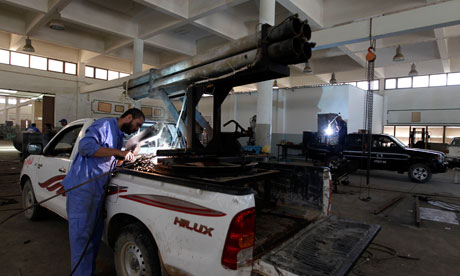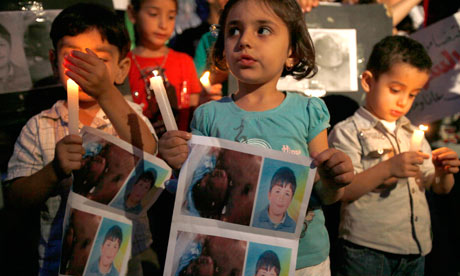Libya's Muammar Gaddafi is willing to hold elections and step aside if he lost, his son said, an offer quickly dismissed Thursday by rebels and the United States.
Gaddafi's son Saif al-Islam told Italian newspaper Corriere della Sera: "They (elections) could be held within three months. At the maximum by the end of the year, and the guarantee of transparency could be the presence of international observers."
He said his father would be ready to step aside if he lost the election, though he would not go into exile.
Prime Minister Al-Baghdadi Ali Al-Mahmoudi later appeared to put the potential concession in question, telling reporters: "I would like to correct (that) and say that the leader of the revolution is not concerned by any referendum."
He added that there was no reason for the Libyan leader to step down in any case, because he had not held any formal political or administrative post since 1977.
A visiting Russian envoy said Al-Mahmoudi had told him Gaddafi would not leave power.
Gaddafi's officials have in the past said an eventual election could be part of a deal to end the crisis, while asserting that the country would rally behind Gaddafi in any vote. Rebels, who rose up four months ago, say they will not trust a political process arranged with Gaddafi still in power.
The rebel leadership in the eastern stronghold of Benghazi dismissed Gaddafi's son's election offer as "wasting our time."
"Saif al-Islam is not in a position to offer elections. Libya will have free elections and democracy but the Gaddafi family has no role to play in this process," Jalal el-Gallal, a rebel spokesman, told Reuters.
"These people are criminals, they have utter disregard for human life. They have to withdraw troops from our cities, allow humanitarian aid to reach people, they will face justice for their crimes. Only then we can talk about holding elections."
A U.S. State Department spokesperson also dismissed the election proposal, saying it was "a little late for that."
The United States, Britain and France, which are leading Western air strikes on Gaddafi's forces, have said they will not stop bombing until Gaddafi leaves power.
The election proposal -- which follows a series of moves the Libyan leader's officials portray as concessions but Western powers dismiss as ploys -- comes at a time when frustration is mounting in some NATO states at slow military progress.
Four months into the conflict, rebel advances toward Tripoli have been slow, while weeks of NATO air strikes pounding Gaddafi's compound and other targets have failed to end his 41-year-old rule over the oil-producing country.
The Russian envoy, Mikhail Margelov, said after talks with Mahmoudi that the issue of Gaddafi's departure from power was a "red line" the Libyan leadership was not willing to cross. He said his task was to soften that position through negotiation.
"I can say that today I am a cautious optimist regarding the resolution of the Libyan crisis," he said.
Late last month Moscow joined the West in calling for Gaddafi to step down, a major diplomatic setback for the leader.
ALLIANCE STRAINS
The NATO intervention in Libya has been going on for longer than many of its backers anticipated, and the strains are beginning to show within the alliance.
NATO officials have said they may not have the resources for a sustained campaign, and Republicans in the U.S. Congress have questioned the legal grounds for continued U.S. involvement.
House of Representatives Speaker John Boehner said lawmakers had options for dealing with the conflict, including "the power of the purse" -- an implicit threat to cut off funding.
Mahmoudi appeared to seize on Washington's disunity.
"We are following the discussion at congress, we are assessing the matter and seeing which way they are going. We are still hoping for a better relationship with the United States based on mutual respect," he said.
Libya-watchers say Gaddafi is using his political skills, honed during decades when he was able to survive despite being an international pariah, to try to exploit divisions within the fragile Western alliance ranged against him.
Adding to the pressure on NATO, Russia and China issued a joint declaration underlining their concerns about the air strikes. The declaration was signed in Moscow by Russian President Dmitry Medvedev and Chinese President Hu Jintao.
"To avoid further escalation of the violence it is necessary to provide for the meticulous adherence by all sides involved" to U.N. resolutions on Libya, the document said.
Russia and China both decided in March not to use their veto power to block air strikes on Libya, but have said NATO risks going beyond the U.N.-authorized mandate to protect civilians.
CAFE BOMBING
Libyan officials took foreign reporters, to a cafe in the center of Tripoli which they said had been destroyed in a NATO air strike overnight.
"There is no justification for this attack," Deputy Foreign Minister Khaled Kaim told reporters, standing near the cafe. The building was a wreck of twisted metal and debris, and the dust from pulverized concrete coated the street.
Asked about the NATO bombing campaign, Kaim said: "It is not working and it will not work."
The cafe is near the Libyan parliament building and other government buildings, in an area which has been bombed several times. A Tripoli resident, who did not want to be identified, said the cafe was frequented by government officials.
NATO began air strikes on Tripoli after Gaddafi's troops used force to put down a rebellion against his rule in February.
The Libyan leader has described the rebels as "rats" and says NATO's campaign is an act of colonial aggression aimed at stealing Libya's oil.
Rebel forces are now fighting Gaddafi's troops on three fronts: in the east of the country around the oil town of Brega, on the road to Tripoli from the rebel-held port of Misrata, and in the Western Mountains southwest of Tripoli.
They have made slow but important gains in the past few weeks in the mountains and near Misrata, bringing the front closer to Tripoli from the east and southwest.
French Armed Forces spokesman Thierry Burkhard told reporters Thursday the rebels were making advances "essentially in the West and in a belt they are now developing around the Tripoli region."
Gaddafi has also been weakened by defections of senior officials, who include the foreign minister, the country's top energy official, and dozens of military officers.
Tunisia's state news agency reported that a boat had docked in southern Tunisia Wednesday carrying 19 Libyan servicemen, including officers, who had fled the violence in their country.


 << The rebels on their way to Tripoli
<< The rebels on their way to Tripoli 
 A Libyan woman fires at a graduation ceremony after a weapons training course in Tripoli
A Libyan woman fires at a graduation ceremony after a weapons training course in Tripoli 

 Ayman al-Zawahiri 'lacks a peculiar charisma that Osama bin Laden had', says US officials.
Ayman al-Zawahiri 'lacks a peculiar charisma that Osama bin Laden had', says US officials. 








